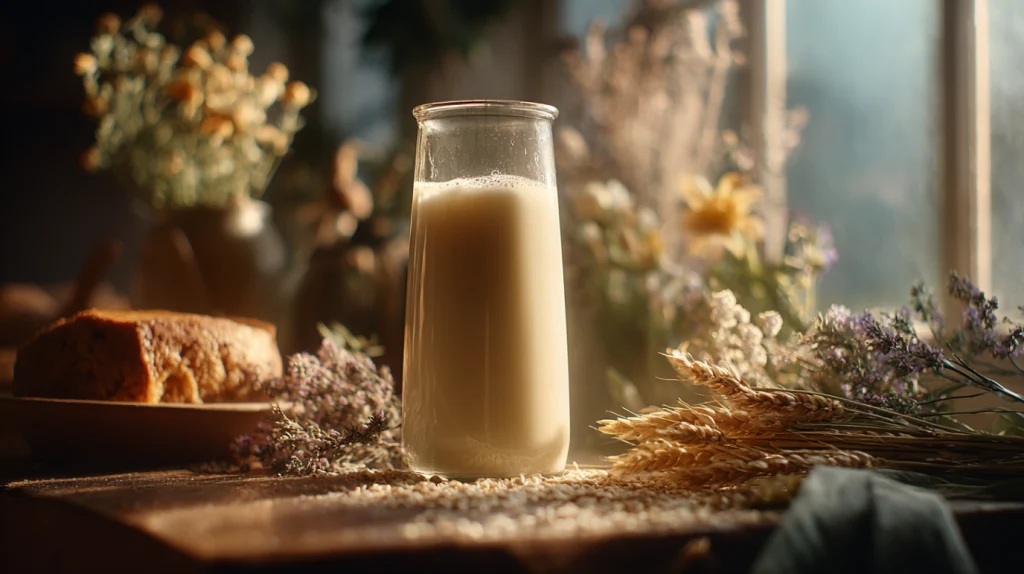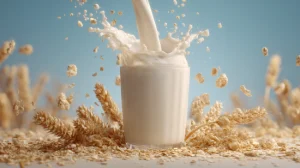
bettergoods Plant-Based Original Soymilk, Half Gallon
- bettergoods Plant-Based Original Soymilk, Half Gallon
- Smooth and creamy plant-based soy milk
- Perfect for savoring your morning coffee, enjoying a relaxing afternoon tea, or whipping up a culinary masterpiece
- Rich in calcium
- A good source of vitamins D and A
- 8 grams of protein per serving
- 8 servings per container
- GLUTEN FREE
$2.86
Discovering Plant-Based Perfection in a Carton
I still remember the first time I tried Bettergoods Soy Milk. It was a chilly autumn morning, and I was desperately seeking a dairy alternative that wouldn’t ruin my coffee with that watery, separated mess that so many plant milks create. Little did I know that random purchase would change my daily routine forever. Three years and countless cartons later, I’ve become something of an unofficial Bettergoods ambassador among my friends and family. Today, I’m channeling that enthusiasm into the most comprehensive guide you’ll ever find on this plant-based powerhouse.
What Exactly Is Bettergoods Soy Milk?
Bettergoods Soy Milk isn’t just another plant milk cluttering the already crowded non-dairy section. It’s a premium soy beverage crafted from whole organic soybeans that are thoughtfully sourced and minimally processed. Unlike many competitors who use soy protein isolate (a highly processed form of soy), Bettergoods uses the entire soybean, which preserves more of the natural nutrients and creates that signature creamy texture that makes it stand out from the crowd.
The brand emerged around 2018 as part of the growing consumer demand for high-quality plant-based alternatives. What makes Bettergoods unique is their commitment to simplicity—their original formula contains just filtered water, organic soybeans, and a touch of sea salt. That’s it. No gums, no fillers, no mysterious “natural flavors” that leave you wondering what you’re actually consuming.
If you’re looking for a plant milk that prioritizes purity and taste above all else, Bettergoods Soy Milk should be at the top of your list.
The Bettergoods Difference: Ingredients That Make Sense
When I first flipped over that carton and scanned the ingredients list, I was pleasantly surprised by how short it was. Having tried countless plant milks over the years, I’ve become accustomed to lengthy lists filled with additives I can barely pronounce.
The standard Bettergoods Original Soy Milk contains:
- Filtered water
- Organic whole soybeans
- Sea salt
- Calcium carbonate (for fortification)
- Vitamin D2
- Vitamin B12
That’s it. No carrageenan (a controversial thickener used in many plant milks), no added oils, no phosphates. For those concerned about added sugars, the original version contains no added sweeteners whatsoever—any sweetness comes naturally from the soybeans themselves.
For those who prefer a touch of sweetness, their lightly sweetened version adds a small amount of organic cane sugar, typically around 4-5 grams per serving, which is significantly less than many competing brands that can pack 10-12 grams per cup.
Organic and Non-GMO: The Foundation of Quality
One question I frequently get asked is whether Bettergoods is truly organic and non-GMO. The answer is a resounding yes. Bettergoods uses 100% certified organic soybeans in all their products, which automatically means they’re non-GMO as well (since organic certification prohibits the use of genetically modified organisms).
This commitment to organic sourcing isn’t just a marketing ploy—it fundamentally affects the quality of the product. Conventional soy is one of the most heavily sprayed crops in commercial agriculture, with significant pesticide residues. By choosing organic soybeans, Bettergoods ensures their milk is free from these potential contaminants while supporting more sustainable farming practices.
The USDA Organic seal and Non-GMO Project verification appear prominently on all their packaging, making it easy to identify their commitment to these standards. I’ve found this particularly reassuring given how many “natural” products use vague terminology without actual certification.
Nutritional Powerhouse: What’s In Each Glass
As someone who initially switched to plant milk for health reasons, the nutritional profile of Bettergoods Soy Milk is what ultimately made me a loyal customer. Each 8-ounce serving delivers approximately:
- 8-9 grams of complete protein (comparable to dairy milk)
- 4 grams of heart-healthy fats
- 1-2 grams of fiber (something dairy milk doesn’t provide at all)
- 30% of your daily calcium needs
- 50% of your vitamin B12 requirements
- 30% of vitamin D
- 10% of iron
- Approximately 100-110 calories (unsweetened version)
The protein content is particularly impressive, as many other plant milks (like almond or rice) offer only 1-2 grams per serving. This makes Bettergoods an excellent option for those looking to maintain protein intake while avoiding animal products.
What’s more, soy protein is considered a complete protein, meaning it contains all nine essential amino acids that our bodies can’t produce on their own. This makes it nutritionally comparable to animal proteins—a rare quality in the plant world.
Where to Find This Liquid Gold
When I first discovered Bettergoods, tracking it down required some detective work. Thankfully, its distribution has expanded significantly in recent years. You can now find Bettergoods Soy Milk at:
Natural Food Stores:
- Whole Foods Market (nationwide)
- Sprouts Farmers Market
- Natural Grocers
- Fresh Thyme
- Earth Fare
Conventional Supermarkets:
- Target (in the natural foods section)
- Select Kroger family stores
- Wegmans
- Publix (primarily in southern states)
- Safeway/Albertsons (varies by region)
Online Options:
- Amazon Fresh
- Thrive Market
- Instacart (from participating retailers)
- The Bettergoods official website offers case purchases with subscription options
I’ve found that natural food stores typically carry the full product line, while conventional supermarkets might only stock the original and vanilla varieties. If you’re looking for their specialty flavors or seasonal offerings, you might need to visit a specialized retailer or order online.
One shopping tip I’ve learned: Bettergoods often places their products in both the refrigerated plant milk section AND the shelf-stable milk alternative aisle. If you don’t see it in one location, check the other before giving up!
Price Point: Investment in Quality
Let’s address the elephant in the room—Bettergoods Soy Milk isn’t the cheapest option on the shelf. A half-gallon typically retails between $4.49-$5.99, depending on the retailer and region. This places it at a premium compared to conventional dairy milk and even some other soy milk brands.
However, after years of purchasing it, I’ve come to view this as an investment in quality rather than an expense. The superior taste, cleaner ingredient list, and robust nutritional profile justify the additional cost for me.
For those watching their budget, there are several ways to make Bettergoods more affordable:
- Look for sales—many stores discount plant milks on a rotating basis
- Buy in bulk when on sale (the shelf-stable version has a long expiration date)
- Join their subscription service for a 10-15% discount
- Check their social media pages for occasional digital coupons
- Some natural food stores offer case discounts of 10% when you purchase 12 or more cartons
During peak promotional periods (like “Veganuary” in January or Earth Month in April), I’ve seen prices drop by as much as 30%, making it an excellent time to stock up.
The Flavor Spectrum: Beyond Original
While the original unsweetened variety remains my daily staple, Bettergoods has expanded their lineup to include several flavored options that deserve mention:
Vanilla
Their vanilla version uses real vanilla extract rather than artificial flavoring, creating a subtle, authentic taste that enhances coffee and cereal without overwhelming them. It contains a touch more sugar than the original (about 7 grams per serving), but significantly less than most flavored dairy or plant milks.
Chocolate
The chocolate variety is surprisingly sophisticated—more like a high-quality chocolate milk than the overly sweet versions I remember from childhood. It uses fair-trade cocoa and a moderate amount of organic cane sugar, making it a treat I can feel relatively good about enjoying.
Barista Blend
This specialty formula was developed specifically for coffee applications. It has a slightly higher fat content and added acacia fiber that helps it foam and steam beautifully without separating in hot beverages. For coffee enthusiasts, this version is absolutely worth the slight premium.
Seasonal Offerings
Throughout the year, Bettergoods releases limited-edition flavors that are worth watching for. Their pumpkin spice (fall), mint chocolate (winter), and strawberry (summer) versions make special appearances and tend to sell out quickly. I’ve learned to grab them when I see them!
Dietary Considerations: Who Can Enjoy Bettergoods?
One of the aspects I appreciate most about Bettergoods is how inclusive it is for various dietary needs:
Vegan-Friendly
Bettergoods Soy Milk is 100% plant-based with no animal derivatives whatsoever, making it suitable for vegans. Even their vitamin D is sourced from plants (D2) rather than lanolin (animal-derived D3).
Gluten-Free
All Bettergoods products are certified gluten-free, with testing below 10 ppm (parts per million)—even stricter than the FDA requirement of 20 ppm. This makes it safe for those with celiac disease or gluten sensitivity.
Nut-Free
Unlike many plant milk brands that produce almond or cashew milk in the same facilities, Bettergoods operates a dedicated soy milk facility that’s completely free from tree nuts and peanuts, making it safe for those with nut allergies.
Kosher and Halal
All products are certified Kosher Parve and Halal, accommodating religious dietary requirements.
The only significant dietary restriction would be for those with soy allergies, who obviously should avoid this product entirely.
Practical Matters: Storage and Shelf Life
Bettergoods offers both refrigerated and shelf-stable versions of their soy milk, which can cause some confusion about proper storage. Here’s what I’ve learned:
Refrigerated Versions
- Must be kept refrigerated at all times
- Typically have a 30-45 day shelf life when unopened
- Last 7-10 days after opening
- Come in plastic recyclable containers
Shelf-Stable Versions
- Can be stored at room temperature until opened
- Have a 10-12 month shelf life when unopened
- Must be refrigerated after opening
- Last 7-10 days once opened
- Come in Tetra Pak cartons
I’ve found the shelf-stable version particularly convenient for keeping as backup supply or for travel. The taste difference between the two is negligible, though some particularly discerning palates might detect a slightly fresher taste in the refrigerated version.
One storage tip I’ve discovered: Bettergoods seems to stay fresher when stored in the back of the refrigerator rather than in the door, where temperature fluctuations can affect taste and texture.
Culinary Applications: Beyond the Glass
While drinking it straight or using it in coffee are the most obvious applications, Bettergoods Soy Milk has become my secret weapon in the kitchen. Its robust protein content and neutral flavor make it extraordinarily versatile:
Baking
The protein structure helps provide binding in baked goods, making it excellent for cakes, muffins, and quick breads. I’ve found it produces moister results than almond milk and doesn’t impart any unwanted flavors.
Savory Cooking
The unsweetened variety works beautifully in cream-based soups, mashed potatoes, and savory sauces. The higher protein content gives it better stability when heated than many other plant milks that tend to separate.
Breakfast Applications
Beyond cereal, I’ve used it to make outstanding overnight oats, chia pudding, and French toast. The vanilla version makes particularly delicious pancakes without needing additional sweetener.
Homemade Yogurt
With the right starter cultures, Bettergoods can be transformed into plant-based yogurt. Its higher protein content results in a thicker, more satisfying texture than yogurts made from thinner plant milks.
Ice Cream Base
The barista blend, with its slightly higher fat content, makes an exceptional base for homemade vegan ice cream, creating a smoother texture with less iciness than other plant milk alternatives.
One cooking tip: When using Bettergoods in recipes that require boiling, keep the heat moderate and stir frequently. Like all soy milks, it can form a skin on top if boiled aggressively.
Environmental Impact: Making Conscious Choices
As consumers become increasingly aware of the environmental footprint of their food choices, plant milks generally offer advantages over dairy. However, not all plant milks are created equal from a sustainability perspective.
Bettergoods uses organic soybeans grown primarily in the American Midwest and Canada, avoiding connections to rainforest deforestation that has plagued some international soy production. Their soybeans are grown using regenerative farming practices that prioritize soil health and biodiversity.
From a water usage perspective, soy milk is one of the more efficient plant milks. While almond milk requires approximately 1,929 gallons of water to produce a single liter, soy milk requires only about 297 gallons—still significantly less than dairy milk’s 628 gallons but more than oat milk’s 48 gallons.
Bettergoods has also made strides in packaging sustainability:
- Their Tetra Pak cartons are made from FSC-certified paperboard
- Refrigerated containers use 30% post-consumer recycled plastic
- They’ve reduced packaging weight by 15% over the past three years
- A pilot program for plant-based cartons is underway in select markets
While no packaged food product has zero environmental impact, Bettergoods demonstrates a commitment to minimizing their footprint through thoughtful sourcing and packaging decisions.
The Competition: How Does Bettergoods Compare?
Having tried virtually every soy milk brand available in North America (yes, I’m that dedicated), I can offer some honest comparisons:
Silk
As the market leader, Silk is Bettergoods’ most direct competitor. Silk is more widely available and typically about $1-1.50 cheaper per half-gallon. However, Silk uses more additives, including gellan gum and natural flavors, and their soybeans aren’t always organic across all product lines. Taste-wise, I find Silk slightly sweeter and thinner in texture.
Edensoy
Edensoy is perhaps closest to Bettergoods in philosophy, using minimal ingredients and organic soybeans. However, Edensoy only offers shelf-stable varieties and has a distinctly beany flavor that some find off-putting. Their protein content is comparable to Bettergoods.
Westsoy
Another minimal-ingredient option, Westsoy is typically shelf-stable only and lacks fortification with calcium and vitamins, which Bettergoods includes. The texture tends to be thinner and sometimes grainier.
Store Brands (365, Good & Gather, etc.)
Store brand soy milks have improved dramatically in recent years but still typically contain more additives and less protein than Bettergoods. They win on price but sacrifice some quality and nutritional density.
West Life
A newer competitor, West Life offers similar quality to Bettergoods at a comparable price point. Their distribution is more limited, making Bettergoods easier to find in most regions.
For those focused on taste and texture without dietary restrictions, Bettergoods’ barista blend most closely mimics dairy milk in coffee and cereal applications, which is why it’s become my go-to recommendation for those transitioning away from dairy.
The Voice of the People: Customer Reviews
I’m clearly enthusiastic about Bettergoods, but I’m just one voice. Across various retail platforms and the company’s own site, Bettergoods consistently earns 4.5-4.8 out of 5 stars in customer reviews.
Common praise points include:
- The clean, minimal ingredient list
- Creamy texture that doesn’t separate in coffee
- Neutral, non-beany flavor
- Higher protein content than other plant milks
- Versatility in cooking applications
The most frequent criticisms center around:
- Higher price point compared to conventional options
- Limited availability in some regions
- Occasional packaging issues (leaking cartons)
- Some find the unsweetened version too plain after sweetened alternatives
What’s particularly telling is how many reviewers mention switching to Bettergoods after trying multiple other plant milks. The brand seems to have found a sweet spot for those seeking quality and nutrition without sacrificing taste.
Making the Switch: Tips for New Users
If you’re considering trying Bettergoods Soy Milk for the first time, here are some tips I’ve gathered from my own experience and from friends I’ve converted:
- If you’re coming directly from dairy milk, try the original or lightly sweetened version first rather than unsweetened, which might taste too plain initially.
- For coffee drinkers, the barista blend is worth the extra cost—it’s specifically formulated to perform well in hot beverages without separating.
- Give yourself a 7-10 day adjustment period. Many people find their taste preferences adapt after consistently using a new product.
- Store it in the coldest part of your refrigerator—soy milk generally tastes better very cold.
- Shake the carton vigorously before each use, as natural separation can occur.
- If using it for cooking, introduce it to recipes that have strong flavors first, where the subtle differences from dairy will be less noticeable.
- Try it in a variety of applications rather than judging it solely on one use case. You might find it works beautifully in smoothies even if you don’t love it in coffee, for example.
Special Promotions and Savings Opportunities
While Bettergoods rarely offers direct coupons, there are several ways to save on your purchases:
Subscription Services
Their direct-to-consumer subscription offers 15% off and free shipping on orders over $35. You can customize delivery frequency from weekly to monthly.
Seasonal Promotions
Major plant-based promotion periods typically occur in January (“Veganuary”), April (Earth Month), and October (World Vegetarian Month). During these times, many retailers offer significant discounts on Bettergoods products.
Loyalty Programs
If purchasing through natural food stores like Whole Foods or Sprouts, their store loyalty programs often provide additional discounts or points on plant milk purchases.
Bundle Deals
The Bettergoods website occasionally offers bundle deals when purchasing multiple varieties together, providing savings of 10-20% compared to individual purchases.
Social Media Giveaways
Following Bettergoods on Instagram and Facebook can alert you to periodic giveaways and flash promotions that aren’t advertised elsewhere.
Final Thoughts: Is Bettergoods Worth It?
After three years as a dedicated Bettergoods customer, my conclusion is a resounding yes—with a few caveats.
If you prioritize clean ingredients, higher protein content, excellent taste, and versatility in cooking, Bettergoods represents good value despite its premium price. The quality is consistently high, and the nutritional benefits are tangible, especially for those following plant-based diets who need reliable protein sources.
However, if budget is your primary concern or you use plant milk only occasionally in coffee or cereal, there are certainly more economical options available. The difference might not be significant enough to justify the additional cost in those cases.
For my household, where we use plant milk daily across multiple applications from morning coffee to cooking dinner, the versatility and quality of Bettergoods has made it a pantry staple worth investing in.
The bottom line: Bettergoods Soy Milk represents the gold standard in soy beverages, offering exceptional quality, nutrition, and versatility for those willing to invest a bit more in their plant-based lifestyle.
Whether you’re a longtime plant milk enthusiast or just dipping your toe into dairy alternatives, Bettergoods offers something truly special in the increasingly crowded plant milk landscape. Your morning routine—and your recipes—will thank you.







